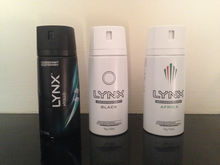Axe (brand)
 From Wikipedia - Reading time: 9 min
From Wikipedia - Reading time: 9 min
This article possibly contains original research. (September 2017) |
| Product type | Men's grooming products |
|---|---|
| Owner | Unilever |
| Country | France |
| Introduced | 6 June 1983 |
| Markets | Worldwide |
| Website | www www |
Axe or Lynx is a French brand of male grooming products owned by the London based company Unilever and marketed toward the younger male demographic. It is marketed as Lynx in the United Kingdom, Ireland, Malta, Australia, New Zealand and China.[1][2]
Products
[edit]

Axe aka Lynx was launched in France in 1983 by Unilever.[3] It was inspired by another of Unilever's brands, Impulse.[citation needed] Unilever introduced many products in the range, but was forced to use the name Lynx in the United Kingdom, Ireland, Australia, and New Zealand due to trademark issues with the Axe name. In addition, some countries (such as South Africa) introduced the brand as EGO until 2002.[4][5]
Scents have evolved over time. From 1983 until about 1989, the variant names were descriptions of the fragrances and included Musk, Spice, Amber, Oriental, and Marine. From 1990 until 1996, geographic names for fragrances were used. In 2009, the brand launched an eight-centimetre container called the Axe Bullet. The brand has also extended into other areas.
Most scent names usually have a shower gel to accompany them and sometimes an antiperspirant/deodorant stick and an aftershave lotion. The Axe Shampoos come in three different sizes: regular size, travel or sample size, and XL bottles. Axe also ships a shower scrub tool called the Axe Detailer.[6]
Axe also launches limited edition variants from time to time that may be on sale for a few months or over a year.[citation needed]
Marketing
[edit]From the 1990s, Axe advertisements portrayed various ways the products supposedly helped men attract women. In 2003, the advertising in the UK for the Pulse fragrance showed how it supposedly gave "geeky" men the confidence to woo women with dance. This was followed by Touch, Unlimited,[7] Clix,[8] and in 2007, Vice,[8] which was marketed on a theme of making "nice" women become "naughty". Due to trademark issues, Axe products are sold under the Lynx brand name in the UK, Ireland, Australia, and New Zealand.
Their Twitter handle is also active in marketing Axe's various products and campaigns. The social media profile also proclaim that their "tweets are banger".
However, a trend called smellmaxxing contributed to a decline in the popularity of Axe, whereas high-end fragrances became more popular.[9]
PR controversies
[edit]Adverse publicity has been generated by the product's advertisements for encouraging sexual promiscuity and sexism.[10] The Campaign for a Commercial-Free Childhood claimed that Bartle Bogle Hegarty's work on Axe "epitomizes the sexist and degrading marketing that can undermine girls' healthy development."
On 12 January 2008 12-year-old Daniel Hurley from Derbyshire, England, died in a hospital five days after collapsing at his home. The medical coroner ruled that he had suffered from cardiac arrhythmia and died from heart failure as a result of spraying large amounts of Lynx in a confined space.[11] Videos on social networking sites depicted teens setting themselves on fire after spraying themselves with Axe. The trend resulted in multiple injuries.[12] After these incidents occurred, the company created two ads, one against the use of Axe as an inhalant, and the other warning of its flammability.[13]
References
[edit]- ^ Van Den Bergh, Joeri; Behrer, Mattias (2011). How Cool Brands Stay Hot: Branding to Generation. Kogan Page Publishers. pp. 130–131. ISBN 9780749462512.
- ^ "About Axe and Lynx on the Unilever website". Archived from the original on 2 January 2018. Retrieved 1 January 2018.
- ^ Feifer, Jason (7 August 2012). "How Axe Built A Highly Scientific, Totally Irresistible Marketing Machine Built On Lust". Fast Company. Archived from the original on 15 October 2019. Retrieved 15 October 2019.
- ^ Van Den Bergh, Joeri; Behrer, Mattias (2013). How Cool Brands Stay Hot: Branding to Generation. Kogan Page Publishers. p. 145. ISBN 9780749468057. Archived from the original on 15 December 2019. Retrieved 7 July 2016.
- ^ Osborne, Grant (2 July 2002). "Unilever give Ego the Axe – will Lynx be next?". Base Notes. Archived from the original on 24 January 2023. Retrieved 20 January 2022.
- ^ Wong, Elaine (25 November 2008). "Unilever Puts Axe Shower Tool on Display with SnapAds". Ad Week. Archived from the original on 15 October 2019. Retrieved 15 October 2019.
- ^ "New Lynx fragrance set to deliver 'Unlimited' sales". Unilever.co.uk. Archived from the original on 2 June 2009. Retrieved 2009-05-09.
- ^ a b "Lynx- Click". Unilever.co.uk. Archived from the original on 6 January 2009. Retrieved 2009-05-09.
- ^ Holtermann, Callie (19 May 2024). "Need a New Cologne or Fragrance? Ask a Teen Boy". The New York Times. Retrieved 23 October 2024.
- ^ Harris, Paul (9 July 2006). "The Menaissance: The American male is learning to flex his muscles again". London: Guardian. Archived from the original on 6 November 2022. Retrieved 9 May 2009.
- ^ "Boy, 12, Died After Spraying Deodorant: Lynx Aerosol Triggered Heart Condition In Daniel Hurley". News.sky.com. Archived from the original on 12 March 2009. Retrieved 2009-05-09.
- ^ Qadar, Sana (28 September 2007). "Teen burned in popular body spray stunt". CTV.ca. Archived from the original on 6 April 2012. Retrieved 18 December 2016.
- ^ "Responsible Use". The Axe Effect. Archived from the original on 6 August 2009. Retrieved 27 January 2010.
 KSF
KSF